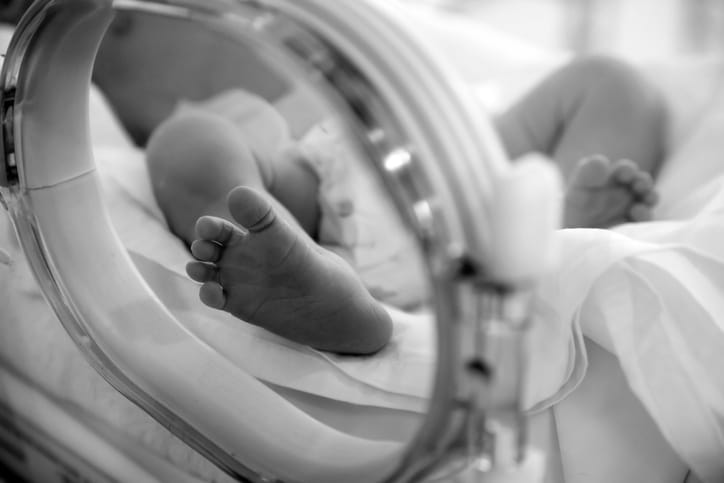The U.S. welcomed over 3.6 million babies in 2021. For many families, their newborn’s arrival is a joyous occasion. Within a day or two, mom and baby are ready to leave the maternity ward and head home.

For some, birth complications overshadow the infant’s arrival. If a birth injury causes brain damage, the infant could spend weeks or months in the NICU receiving medical treatment, preventing the parents from bringing their newborn home. When a birth injury causes permanent brain damage, the family could face a lifetime of medical bills, care costs, and other expenses.
It’s understandable for you to be frightened and frustrated if your child suffered a birth injury. It’s natural for you to want answers and to know how the birth injury happened. A birth injury attorney can get the answers you seek and help determine if someone’s medical malpractice or negligence caused the injury. Understanding the types of brain damage caused by a birth injury, what qualifies as medical malpractice or negligence, and what a birth injury lawyer does can help you understand the next steps to take after your newborn’s birth injury.
Was your newborn affected by a birth injury? Contact Jack Bernstein, Injury Attorneys now.
How common is brain damage at birth?
Although birth injuries in the U.S. affect just 0.007% of newborns, this means approximately 30,000 infants suffer a birth injury each year. This number includes multiple types of birth injuries, including injuries that don’t involve brain damage, such as the following:
- Abrasions
- Brachial plexus
- Broken bones
- Erb’s palsy
- Facial paralysis
- Lacerations
- Spinal cord injuries
Abrasions and lacerations may heal within one to three weeks and cause no permanent damage. However, a severe spinal cord injury could cause permanent paralysis. The prognosis depends on the type of birth injury and its severity.
Brain damage affects 0.003% of babies born in the U.S. each year, equal to 42.8% of all birth injuries. Applied to the 3.6 million babies born annually, this means 10,800 newborns suffer a birth injury resulting in brain damage.
The brain damage rate is notably higher than the rate of Erb’s palsy, for example, which affects just 0.001% of newborns.
Types of brain injuries at birth
The following are some common types of brain injuries caused during birth:
- Cerebral palsy: Cerebral palsy affects the part of the brain used to control movement, which is why people with cerebral palsy have issues with their mobility. Since babies don’t have complete motor control, some infants may not be diagnosed with cerebral palsy until they’re several months old.
- Hydrocephalus: This condition occurs when the brain’s cavities fill up with cerebrospinal fluid. People with hydrocephalus may have balance, bladder control, coordination, and vision issues. Symptoms can also include diarrhea, headaches, and nausea. Prompt treatment is crucial. Only 20% of those with hydrocephalus survive to adulthood without treatment.
- Hypoxic-ischemic encephalopathy: When newborns don’t have enough blood flow and oxygen to their brain during birth, they can suffer from hypoxic-ischemic encephalopathy. Symptoms vary and include seizures, breathing issues, and problems with reflexes and muscle tone.
- Intraventricular hemorrhage: When a newborn has bleeding around the brain’s ventricles, they have an intraventricular hemorrhage. The build-up of blood causes nerve cell damage by putting extra pressure on those cells. Symptoms include anemia, apnea, and seizures.
- Newborn cephalohematoma: Newborn cephalohematoma can cause fatigue, seizures, vomiting, and other symptoms. This condition occurs when blood builds up under the newborn’s scalp.
- Periventricular leukomalacia: Premature infants with periventricular leukomalacia suffer permanent brain damage because the condition kills some brain tissue. Symptoms can vary, although it’s common for periventricular leukomalacia to cause issues with mobility and vision.
What causes brain damage in newborns?
The following are some of the main causes of brain damage in newborns:
- Jaundice: Jaundice causes the skin to turn yellow, and there may also be a yellow tinge in the whites of the eyes. Although jaundice is common and most babies heal without treatment, severe cases can cause kernicterus. Kernicterus can cause cerebral palsy and hearing loss and, in severe cases, can be fatal.
- Maternal infection: The mother’s health significantly impacts their baby’s health. The following are some of the viral and bacterial infections that can cause brain damage:
- Cytomegalovirus
- Intrauterine infection
- Meningitis
- Rubella
- Oxygen deprivation: A newborn’s air supply can be cut off because of events during childbirth, such as the placenta detaching or the umbilical cord wrapping around the baby’s neck
- Physical trauma: Physical trauma is a possibility during natural childbirth, mainly if the baby’s head gets stuck in the birth canal. Delivery aids, such as forceps and vacuum extractors, can also cause physical trauma.
How to know if a birth injury is medical malpractice or negligence
Birth injuries may stem from accidents, medical malpractice, or medical negligence. The cause determines whether you have grounds for compensation from a legal claim.
Elements of medical malpractice
Medical malpractice is serious because it applies when someone makes a deliberate choice that causes harm. It can include intentional actions, such as recommending an unnecessary or unsafe treatment, or other inactions, such as dismissing a patient’s symptoms and choosing not to identify their cause and provide treatment. Proving medical malpractice involves establishing the following:
- Duty of care: Establishing duty of care means proving the accused was responsible for caring for your infant. Duty of care applies to obstetricians, delivery nurses, and others involved with the mother and infant’s care before and during birth.
- Breach of duty: You must establish one or more parties with a duty of care failed to deliver standard medical care
- Causation: Establishing causation means proving that the breach of duty of care caused the infant harm
- Actual damages: Damages refer to costs stemming from the breach of duty, such as medical bills
You must show one or more medical professionals were responsible for providing you and your infant with medical care, that they did not meet the requirements of an acceptable standard of care, that failure caused harm, and that there are costs stemming from the harm caused by their negligence.
How to establish negligence
Medical negligence applies when a medical professional makes an unintentional mistake. The distinction between medical malpractice and negligence lies in intent. Professionals guilty of malpractice make deliberate choices despite knowing those choices may cause harm. In contrast, those guilty of negligence intend to provide appropriate treatment but make an intentional error that causes harm.
What damages can be recovered if brain damage is the result of medical malpractice?
If your newborn suffers brain damage during birth because of medical malpractice, you can seek monetary and non-monetary damages.
Monetary or economic damages refer to actual expenses stemming from the injury. Some of these expenses may be anticipated expenses, particularly if your newborn suffers permanent brain damage and will need care or treatment throughout their lifetime. Monetary damages can include the following:
- Childcare costs
- Funeral and burial costs
- Hospital bills
- Loss of income
- Medical equipment costs
- Occupational, physical, or speech therapy bills
- Relocation costs
Parents may seek compensation for lost wages if they need to extend their parental leave to care for their newborn. Parents can also seek compensation for relocation costs if their newborn’s condition requires them to use a wheelchair or another assistive device that makes relocation necessary. For example, a child with mobility issues may have difficulty navigating stairs and need to live in a one-level home.
Non-monetary or non-economic damages provide compensation for the mental and emotional toll the brain injury causes. Grounds for non-monetary damages can include the following:
- Anxiety
- Depression
- Grief
- Pain and suffering
- Post-traumatic stress disorder
Who is responsible for birth injuries?
Any medical professional providing care before or during birth could be responsible for a newborn’s birth injury. Some commonly responsible include the following:
- Delivery nurse: A nurse could be liable for negligence or malpractice if their actions or inactions cause a birth injury
- Doctor: Suppose your doctor fails to treat an infection that causes a birth injury. Your primary care physician could be liable.
- Obstetrician: Your obstetrician could be liable for failing to perform a cesarean section or allowing prolonged labor to continue without intervention, resulting in brain damage
Florida’s statute of limitations for birth injury claims
Florida gives birth injury victims two years to take legal action against those responsible. This means you or your lawyer must file your case with the courts within 24 months; it does not mean the case has to be resolved within two years. Medical malpractice cases may take a year or more to settle after being initiated.
How can Jack Bernstein, Injury Attorneys, help me?

When you hire Jack Bernstein, Injury Attorneys, the best birth injury lawyers in Tampa, we will fight for justice for your newborn’s birth injury. We know you have your hands full caring for a newborn with health issues. We let you focus on your family’s needs while we investigate your infant’s birth injury. We’ll gather evidence, interview witnesses, and build your case. We’ll also file the court paperwork and serve the defendants to ensure your case is heard.
We’ll help you calculate the damages you can seek and fight for you to get the maximum amount of compensation available for your newborn’s birth injury, ensuring you have the funds you need to cover current and future expenses for your child.
Contact Jack Bernstein, Injury Attorneys now for a free consultation about your newborn’s birth injury.
Sources:
Birth injury statistics. (2023).
Cerebral palsy. (2023).
Hamilton, B.E., et al. (2022). Births: Provisional Data for 2021.
Jacob, D., et al. (2022). What is the Survival Rate of Hydrocephalus?
About Jack G. Bernstein Esq.
Personal Injury Lawyer

For more than 40 years, personal injury lawyer Jack G. Bernstein has protected the rights of individuals who have been injured in a variety of circumstances. Throughout his career, Bernstein has been a strategist thoroughly dedicated to the idea of protecting the rights of his clients. Mr. Bernstein is a member of the Florida State Bar Association, the Hillsborough Bar Association and the Clearwater Bar Association.
Mr. Bernstein has the experience and expertise to handle a wide range of injury cases. Among the types of plaintiffs Mr. Bernstein represents are individuals involved in car accidents caused by drunk drivers or other exhibiting negligence, medical complications resulting from carelessness caused by a physician or a medical facility, including brain injury, bicycle, motorcycle, moped and truck accidents, admiralty law and cruise ship accidents, accidental drownings, all types of wrongful death lawsuits, along with most injury, catastrophic occurrences and legal malpractice issues.
Our firm handles every type of personal injury and accident case, using negotiation and litigation tactics effectively. We handle cases throughout Tampa, Sarasota, St. Petersburg, and Clearwater, FL. With a staff of approximately 40 people, including six lawyers and 34 support personnel, we have the legal resources to get the justice you deserve and the maximum recovery for your losses. Schedule your free consultation today; we are always here to help.
Free Case Evaluation
No Fees Unless We Win
No upfront fees, no risk, and no out of pocket cost to you or your family.
Entirely confidential – we respect your privacy, consultations are privileged.
